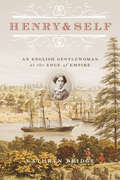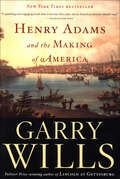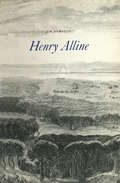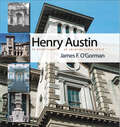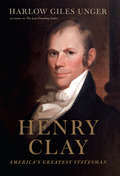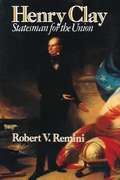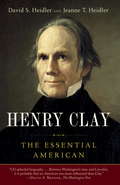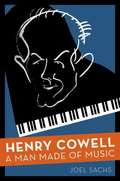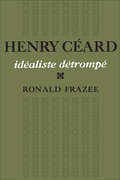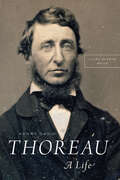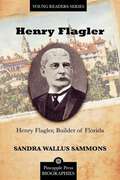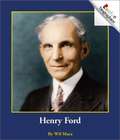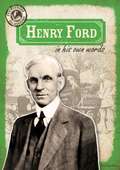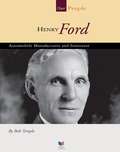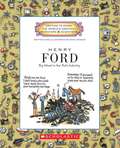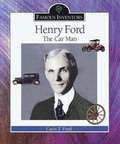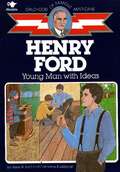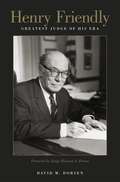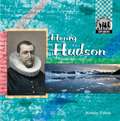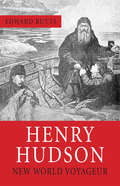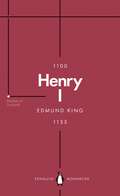- Table View
- List View
Henry & Self: An English Gentlewoman at the Edge of Empire
by Kathryn BridgeAn intimate portrait of privilege and struggle, scandal and accolade, from the Old World to the new colonies of Vancouver's Island and British Columbia.At the age of 33, Sarah Crease left her home in England to travel with her young family to a farflung outpost of the British Empire on the Pacific coast of North America. The detailed journals, letters and artwork she created over the next half century as she and her husband, Henry, established themselves in the New World offer a rich window into the private life and views of an English colonist in British Columbia.This is a woman's story in her own words. It is also a story of the times she lived in, and of how her class, social standing and role as a settler shaped her relationships with the world around her. Henry & Self is the personal account of a remarkable woman who lived through nearly a century of colonial history, but it is also a unique perspective on the beliefs and motivations that shaped that century.
Henry Adams and the Making of America
by Garry WillsNew York Times Bestseller: From a Pulitzer Prize winner, a “sparking and engaging book that everyone who cares about America’s history should read” (The Washington Post).In this book, one of today’s greatest historians offers a surprising new view of the greatest historian of the nineteenth century: Henry Adams. Garry Wills, author of Lincoln at Gettysburg, showcases Adams’s little-known but seminal study of the early United States and elicits from it fresh insights on the paradoxes that roil America to this day. Adams drew on his own southern fixation, his extensive foreign travel, his political service in Lincoln’s White House, and much more to invent the study of history as we know it. His nine-volume chronicle of America from 1800 to 1816 established new standards for employing archival sources, firsthand reportage, eyewitness accounts, and other techniques that have become the essence of modern history.Adams’s innovations went beyond the technical; he posited an essentially ironic view of the legacy of Jefferson and Madison. As is well known, they strove to shield the young country from “foreign entanglements,” a standing army, a central bank, and a federal bureaucracy, among other hallmarks of “big government.” Yet by the end of their tenures they had permanently entrenched all of these things in American society. This is the “American paradox” that defines us today: the idealized desire for isolation and political simplicity battling against the inexorable growth and intermingling of political, economic, and military forces. As Wills compellingly shows, the ironies spawned two centuries ago still inhabit our foreign policy and the widening schisms over economic and social policy. Ambitious in scope, nuanced in detail and argument, Henry Adams and the Making of America throws brilliant light on how history is made—in both senses of the term.“Felicitous prose and compelling argument.” —Publishers Weekly (starred review)“Wills [is] incapable of writing a dull paragraph.” —Los Angeles Times
Henry Adams: A Biography
by Elizabeth StevensonHenry Brooks Adams was an American historian and member of an elite New England political family, descended from two U.S. Presidents--John Adams and John Quincy Adams. With the publication of his autobiography, "The Education of Henry Adams," in 1907, Henry Adams became the interpreter of his age. His insights and his attacks on the chaos and complexity of modern times stirred people everywhere. Depicting himself as a man seeking the meaning of life, he concluded that the quest ended in failure and predicted universal dissolution. Yet the picture he drew of himself was not complete, and since his death in 1918, he has become one of the most controversial figures in American letters. This is the first biography to give a well-rounded portrait of Adams and to shed a full light on his unique personality and writings.
Henry Alline: 1748-1784
by J. M. BumstedTo Canadians of this century the name of Henry Alline is almost unknown. This biography introduces him to the general reader. Through the story of his life it also recreates the early settlement of the Maritime provinces, and examines the origins of one of the most dominant and continuing themes in Canadian life, evangelical pietism. Henry Alline emigrated from Rhode Island to Nova Scotia with his parents in 1760. Following his religious conversion during adolescence, he became an evangelical preacher and travelled throughout Nova Scotia spreading the gospel. But Alline was more than an itinerant preacher. Drawing on British (and indirectly on German) mythical writings, he rejected the tenets of Calvinism in favour of universal salvation and human free will. He emphasized Christian asceticism and mysticism. His writings, and his attempts to develop an intellectual rationale for his evangelical position, made him Canada's first metaphysical and mystical philosopher.In the history of early British settlement in Nova Scotia the name of Alline stands out because of his participation in the process and problems of settlement and his leadership during the trying times of the American Revolution. His career embodied a rejection of both the United States (by a rejection of Puritanism) and of Britain (by a rejection of church and state in Nova Scotia), and put Alline in a classic Nova Scotia position, neutrality, which could be justified by the importance of Christ and the relative unimportance of government. The years in which Alline lived were particularly critical ones for Canada, and his career both mirrors and dominates a period of pioneer hardships, political crises, and spiritual concern born of the uncertainties of human existence.
Henry Austin: In Every Variety of Architectural Style (Garnet)
by James F. O'GormanWinner of the Historic New England Book Prize (2009) Winner of the Henry-Russell Hitchcock Book Award (2010) Henry Austin's (1804–1891) works receive consideration in books on nineteenth-century architecture, yet no book has focused scholarly attention on his primary achievements in New Haven, Connecticut, in Portland, Maine, and elsewhere. Austin was most active during the antebellum era, designing exotic buildings that have captured the imaginations of many for decades. James F. O'Gorman deftly documents Austin's work during the 1840s and '50s, the time when Austin was most productive and creative, and for which a wealth of material exists. The book is organized according to various building types: domestic, ecclesiastic, public, and commercial. O'Gorman helps to clarify what buildings should be attributed to the architect and comments on the various styles that went into his eclectic designs. Henry Austin is lavishly illustrated with 132 illustrations, including 32 in full color. Three extensive appendices provide valuable information on Austin's books, drawings, and his office
Henry Clay: America's Greatest Statesman
by Harlow Giles UngerA compelling new biography of America's most powerful Speaker of the House, who held the divided nation together for three decades and who was Lincoln's guiding light
Henry Clay: Statesman for the Union
by Robert V. ReminiAmong nineteenth-century Americans, few commanded the reverence and respect accorded to Henry Clay of Kentucky. As orator and as Speaker of the House for longer than any man in the century, he wielded great power, a compelling presence in Congress who helped preserve the Union in the antebellum period. Remini portrays both the statesman and the private man, a man whose family life was painfully torn and who burned with ambition for the office he could not reach, the presidency.
Henry Clay: Statesman for the Union (citated)
by Robert V. ReminiRobert V. Remini summed up the sentiment that many people of the antebellum period of U.S. history had about Henry Clay. "Henry Clay was one of the most gifted men of his age. He distinguished himself as a public speaker, a lawyer, a politician, and Speaker of the House of Representatives. He might have made a truly great President" ([PAGE 209 OF THE TEXT]) if he had been given a chance. While praising Henry Clay, Remini also cited evidence that portrayed Clay as a controlling, hot-tempered, and often irrational, and immoral man. At times, people had trouble interacting with him while at other times he was extremely hospitable and friendly. In short, Remini described a man who both clamored for political power and, at the same time, wanted to contribute to the success of the country; that is, he deeply yearned for and acted in a manner that he thought was best for the union while simultaneously believing that he was the most qualified for this difficult task. In this biography, Remini described both the political and personal life of Henry Clay. Through this portrayal, the reader not only gains insight into the personal and political life of Henry Clay, but learns about the historical and cultural aspects of the time. The reader is able to enter into the struggles and conflicts of the age. These conflicts included such aspects as slavery and party politics. Even though this biography is non-fiction, it often reads as a fictional novel. Remini interspersed anecdotes, letters, and other writings into the historical details of the biography to allow the reader to understand the character and personality of Henry Clay and other famous and ordinary people. The biography is replete with numerous footnotes that give the biography authenticity as well as give the reader knowledge about the period and explanations about aspects that might not be understood by non-historians.
Henry Clay: The Essential American
by David S. Heidler Jeanne T. HeidlerHe was the Great Compromiser, a canny and colorful legislator whose life mirrors the story of America from its founding until the eve of the Civil War. Speaker of the House, senator, secretary of state, five-time presidential candidate, and idol to the young Abraham Lincoln, Henry Clay is captured in full at last in this rich and sweeping biography.David S. Heidler and Jeanne T. Heidler present Clay in his early years as a precocious, witty, and optimistic Virginia farm boy who at the age of twenty transformed himself into an attorney. The authors reveal Clay's tumultuous career in Washington, including his participation in the deadlocked election of 1824 that haunted him for the rest of his career, and shine new light on Clay's marriage to plain, wealthy Lucretia Hart, a union that lasted fifty-three years and produced eleven children.Featuring an inimitable supporting cast including Thomas Jefferson, James Madison, and Abraham Lincoln, Henry Clay is beautifully written and replete with fresh anecdotes and insights. Horse trader and risk taker, arm twister and joke teller, Henry Clay was the consummate politician who gave ground, made deals, and changed the lives of millions.d replete with fresh anecdotes and insights. But it is Henry Clay who often rises above them all. Horse trader and risk taker, arm twister and joke teller, Clay was the consummate politician who gave ground, made deals, and changed the lives of millions. His life is an astounding tale--and here superbly told.From the Hardcover edition.
Henry Cowell: A Man Made of Music
by Joel SachsJoel Sachs offers the first complete biography of one of the most influential figures in twentieth-century American music. Henry Cowell, a major musical innovator of the first half of the 20th century, left a rich body of compositions spanning a wide range of styles. But as Sachs shows, Cowell's legacy extends far beyond his music. He worked tirelessly to create organizations such as the highly influential New Music Quarterly, New Music Recordings, and the Pan-American Association of Composers, through which great talents like Ruth Crawford Seeger and Charles Ives first became known in the US and abroad. As one of the first Western advocates for World Music, he used lectures, articles, and recordings to bring other musical cultures to myriad listeners and students including John Cage and Lou Harrison, who attributed their life work to Cowell's influence. Finally, Sachs describes the tragedy of Cowell's life, being sentenced to fifteen years in San Quentin -- of which he served four -- after pleading guilty to a morals charge that even the prosecutor felt was trivial. Providing a wealth of insight into Cowell's ideas and philosophy, Joel Sachs lays out a much-needed perspective on one of the giants of twentieth-century American music.
Henry Cérard: idéaliste détrompé
by Ronald FrazeeHere for the first time is an authoritative account of the life and literary activity of a long-neglected writer of the French naturalist school. Its appearance now is especially timely in view of the recent revival of interest in Zola, Maupassant and Huysmans, and the publication of the complete Goncourt Journals. Cérard's written works were virtually neglected by his contemporaries as well as by most historians of the naturalist movement. However, his novels, short stories, and plays had good critical receptions, and in providing this study of the author, as well as a comprehensive bibliography of all his works, Mr. Frazee is performing a valuable service for students of literature. As an artist Cérard was perhaps less powerful than Zola or Goncourt, but one appreciates, as Mr. Frazee has noted, "la prédominance de l'esprit d'analyse sur l'esprit d'imagination." An important contribution was his early experimental novel Une belle journée; this explored in depth a single day in a character's life, and was the first of a number of such novels, which culminated in Joyce's Ulysses. While attempting to give Cérard his due as an artist Mr. Frazee, in seeking to discover the relations between this paradoxical personality and his work, has not hesitated to point out Cérard's personal failings. Cérard was an intriguing blend of deceptive simplicity and surprising complexity, and he showed a pessimism and resignation, typical of the fin de siècle, which were evidence of the influence of Schopenhauer. Because secondary writers often give a better picture of their times than their better-known contemporaries, this biography, too, is able to shed new light on the last thirty years of the nineteenth century while providing an important guide for today's scholars and the future investigators of an important area of French literature.
Henry David Thoreau for Kids: His Life and Ideas, with 21 Activities
by Corinne SmithHands-on nature activities for the budding transcendentalist Author and naturalist Henry David Thoreau is best known for living two years along the shores of Walden Pond in Concord, Massachusetts. He is also known for spending a night in jail for nonpayment of taxes, which he discussed in the influential essay "Civil Disobedience." More than 150 years later, people are still inspired by his thoughtful words about individual rights, social justice, and nature. His detailed plant observations have even proven to be a useful record for 21st-century botanists. Henry David Thoreau for Kids chronicles the short but influential life of this remarkable thinker. In addition to learning about Thoreau's contributions to our culture, young readers will participate in engaging, hands-on projects that bring his ideas to life. Activities include building a model of the Walden cabin, keeping a daily journal, planting a garden, baking trail-bread cakes, going on a half-day hike, and starting a rock collection. The book also includes a time line and list of resources--books, websites, and places to visit--which offer even more opportunities to connect with this fascinating man.
Henry David Thoreau: A Life (Science And Literature Ser.)
by Laura Dassow Walls“Walden. Yesterday I came here to live.” That entry from the journal of Henry David Thoreau, and the intellectual journey it began, would by themselves be enough to place Thoreau in the American pantheon. His attempt to “live deliberately” in a small woods at the edge of his hometown of Concord has been a touchstone for individualists and seekers since the publication of Walden in 1854. But there was much more to Thoreau than his brief experiment in living at Walden Pond. A member of the vibrant intellectual circle centered on his neighbor Ralph Waldo Emerson, he was also an ardent naturalist, a manual laborer and inventor, a radical political activist, and more. Many books have taken up various aspects of Thoreau’s character and achievements, but, as Laura Dassow Walls writes, “Thoreau has never been captured between covers; he was too quixotic, mischievous, many-sided.” Two hundred years after his birth, and two generations after the last full-scale biography, Walls restores Henry David Thoreau to us in all his profound, inspiring complexity. Walls traces the full arc of Thoreau’s life, from his early days in the intellectual hothouse of Concord, when the American experiment still felt fresh and precarious, and “America was a family affair, earned by one generation and about to pass to the next.” By the time he died in 1862, at only forty-four years of age, Thoreau had witnessed the transformation of his world from a community of farmers and artisans into a bustling, interconnected commercial nation. What did that portend for the contemplative individual and abundant, wild nature that Thoreau celebrated? Drawing on Thoreau’s copious writings, published and unpublished, Walls presents a Thoreau vigorously alive in all his quirks and contradictions: the young man shattered by the sudden death of his brother; the ambitious Harvard College student; the ecstatic visionary who closed Walden with an account of the regenerative power of the Cosmos. We meet the man whose belief in human freedom and the value of labor made him an uncompromising abolitionist; the solitary walker who found society in nature, but also found his own nature in the society of which he was a deeply interwoven part. And, running through it all, Thoreau the passionate naturalist, who, long before the age of environmentalism, saw tragedy for future generations in the human heedlessness around him. “The Thoreau I sought was not in any book, so I wrote this one,” says Walls. The result is a Thoreau unlike any seen since he walked the streets of Concord, a Thoreau for our time and all time.
Henry Flagler, Builder of Florida (Pineapple Press Biography)
by Dr. Sandra SammonsAn exciting biography about the man who changed Florida's east coast with his hotels and his Florida East Coast Railway.Henry Morrison Flagler was already a millionaire when he first visited Florida in 1878. He liked what he saw. He came back and built railroads along the east coast so that others could more easily come. And he built grand hotels so that those who came had a beautiful place to stay. By the end of his long and productive life, he had built a railroad all the way to the very end of the Keys. It arrived in Key West in 1912. Henry Flagler was very determined and practical. He met all the great challenges he set for himself.Ages 9-12Next in series > >See all of the books in this series
Henry Ford
by Wil Mara- Age-appropriate vocabulary- Clear linkage between text and photos- Includes archival reproductions where appropriate- Positioned in the middle Early Intervention range- Comprehensive glossary of "Words You Know"- Index makes navigating subject matter easy
Henry Ford for Kids: His Life and Ideas, with 21 Activities (For Kids series #61)
by Ronald A. ReisAn in-depth and realistic portrait of the man who "put America on wheels" Detailing Henry Ford's childhood as a precocious farm-boy mechanic, his revolutionary labor and production ideas, and the lasting legacy of his widespread philanthropy, author Ronald A. Reis also does not shy away from his eccentricities. The issues that stirred controversy are discussed, such as the industrialist's anti-Semitic views and his pacifist beliefs. Packed with historic photos and illuminating sidebars, Henry Ford for Kids brings the turn of the 20th century to life, touching on related topics such as the popularity of "auto polo," the Great War, and the life of industrial architect Albert Kahn. Twenty-one hands-on activities encourage budding innovators to apply engineering and production ideas and learn more about the era as kids will build a lemon-powered battery, make a moving assembly line, learn to dance the waltz, design an automobile dashboard, and much more.
Henry Ford in His Own Words
by Ryan NagelhoutHenry Ford, founder of the Ford Motor Company, didn't invent the car or even his famous assembly line. However, he was the innovator who made these things wildly successful. In fact, his practices and ideas shaped American life and business in the twentieth century, even helping the war effort in World War II, and continue to do so today. This biography uses quotations and writings to trace Henry Ford's rise from humble farm boy to thriving entrepreneur.
Henry Ford: Automobile Manufacturer and Innovator
by Bob TempleA biography of the man responsible for mass producing the automobile in the early part of the twentieth century.
Henry Ford: Big Wheel in the Auto Industry
by Mike VeneziaThis colorful business giant didn't just revolutionize the way the world travels he changed the way it works! Take a ride in the fast lane with Henry Ford, father of the automobile, the assembly line, and 20th-century American industry.
Henry Ford: The Car Man
by Carin T. FordA simple biography of the man who revolutionized American industry with his assembly-line production of automobiles.
Henry Ford: Young Man with Ideas (Childhood of Famous Americans Series)
by Hazel B. Aird Catherine RuddimanA fictionalized biography of the early life of the American automotive industrialist who founded the Ford Motor Company and pioneered in assembly-line methods of mass production.
Henry Friendly, Greatest Judge of His Era
by David M. DorsenFriendly served on the Second Circuit from 1959 to 1986. In the foreword, Judge Richard A. Posner refers to his own skeptical statements about the utility of biographies of judges; pointedly, he reverses that opinion completely with regard to this biography. Washington, D. C. -based attorney Dorsen draws on extensive research and interviews to provide a thoroughly engaging portrait of a brilliant and esteemed man. Belknap Press is an imprint of Harvard U. Press. Annotation ©2012 Book News, Inc. , Portland, OR (booknews. com)
Henry Hudson
by Kristin PetrieThis biography introduces young readers to the life of Englishman Henry Hudson. Readers learn that Hudson's grandfather helped form the Muscovy Company and that Hudson himself later sailed for the Muscovy Company, trying to find a passage to Asia through the North Pole. Hudson's family life and work as a cabin boy are also discussed, as well as his voyage with John Davis to the Canadian Arctic. Through engaging text, readers learn that Hudson's goal was to find a shorter route from Europe to Asia through the Arctic Ocean. His attempts to find a northwest passage to Asia while working for the Dutch East India Company and the British East India Company are explained. Readers also discover that on his final voyage, Hudson was the victim of a mutiny and left to die in the Hudson Bay. The book explains that Hudson's discoveries led to Dutch and English colonization of North America and that today a strait, a bay, and a river are named after Hudson. The book also introduces the idea that Hudson's North American discoveries led other explorers to discover a Northwest Passage.
Henry Hudson: New World Voyager
by Edward ButtsIn 1607 Henry Hudson was an obscure English sea captain. By 1610 he was an internationally renowned explorer. He made two voyages in search of a Northeast Passage to the Orient and had discovered the Spitzbergen Islands and their valuable whaling grounds. In the process, Hudson had sailed farther north than any other European before him. In 1609, working for the Dutch, he had explored the Hudson River and had made a Dutch colony in America possible. Sailing from England in 1610, on what would be his most famous voyage, Hudson began his search for the Northwest Passage through the Canadian Arctic. This was also his last exploration. Only a few of the men under his command lived to see England again. Hudson’s expedition was one of great discovery and even greater disaster. Extreme Arctic conditions and Hudson’s own questionable leadership resulted in the most infamous mutiny in Canadian history, and a mystery that remains unsolved.
Henry I: The Father of His People (Penguin Monarchs)
by Edmund King'To be a medieval king was a job of work ... This was a man who knew how to run a complex organization. He was England's CEO'The youngest of William the Conqueror's sons, Henry I came to unchallenged power only after two of his brothers died in strange hunting accidents and he had imprisoned the other. He was destined to become one of the greatest of all medieval monarchs, both through his own ruthlessness, and through his dynastic legacy. Edmund King's engrossing portrait shows a strikingly charismatic, intelligent and fortunate man, whose rule was looked back on as the real post-conquest founding of England as a new realm: wealthy, stable, bureaucratised and self-confident.
